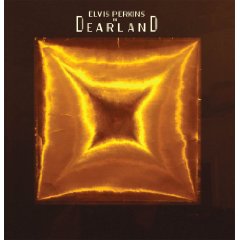Elvis Perkins is not a man without baggage. That he carries it so lightly is a tribute to his lyrical dexterity, yet it remains difficult to divorce the songs from their creator’s biography. His 2007 debut, Ash Wednesday, collated his meditations on grief, death and fate. Written in the wake of the death of his mother (photographer Berry Berenson) aboard American Airlines flight 11 on September 11 2001, it also contained opaque references to his actor father Anthony Perkins’ Aids-related passing almost a decade earlier.
Early comparisons with Bob Dylan, Tom Waits and Leonard Cohen followed, and only added to the load on Elvis’s shoulders. A hell of a burden to carry alone, the singer has now officially incorporated his live line-up of Brigham Brough (bass, vocals, saxophone), Wyndham Boylan-Garnett (organ, harmonium, trombone, guitar) and Nick Kinsey (drums, clarinet) into the band, to be known henceforth as Elvis Perkins In Dearland.
Their influence is apparent after just 30 seconds of stand-out opener ‘Shampoo’, which kick starts a new collection that veers from folked-up Nina Simone to Dixieland stomp and Mariachi mayhem, while never straying too far from the off-kilter troubadour sound that first drew attention.
Similarly on ‘Doomsday’, the marching band sing-along that emerges, with upright bass and swirling organ to the fore, from negotiation between songwriter and band on a song originally written as a funereal dirge is no less affecting or heartfelt.
Indeed, as with many of the songs here, it merely adds layers that reward repeated listens with a slow reveal of the raw, quietly heart-wrenching lyrics. ‘Send My Fond Regards To Lonelyville’ is perhaps the closest to the stripped-down melancholia of Ash Wednesday‘s standout, ‘While You Were Sleeping’. As a harmonium swirls behind the acoustic guitar groove, by the midpoint of its six minutes it has morphed into a stumbling, horn-led celebration, like a solitary drunk whose maudlin mood temporarily swings upwards until he is dancing atop tables.
As with most of the tracks here, however, there is the feeling that it will not be long before the recollection of what drove them to drink on the first place. When the singer quietly spits the title of final track: ‘How’s Forever Been, Baby?’, it is clear that the party’s over. ‘Remember, let’s plant a flowering tree / here in the rubble and debris. I’ll tend it with a tear / if you only hold my hand,’ he sings, quietly, for once not taking shelter behind his bandmates.
While Elvis and his newly merry crew have yet to fully translate the ramshackle energy of live performances into the album they are clearly capable of making, this sophomore effort is the sound of a songwriter growing in stature and scope, and a man staring grief in the eye and emerging with a defiant grin firmly on his face…


